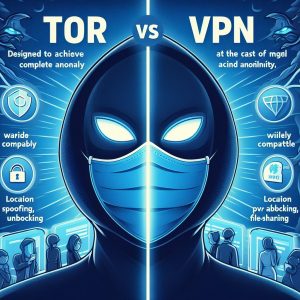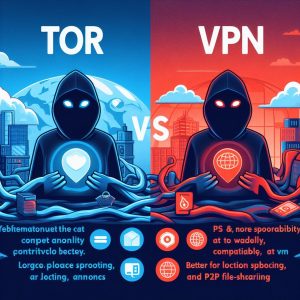Introduction
With data breaches becoming commonplace and web surveillance pervasive, online privacy is paramount. Tor and VPN (virtual private network) have emerged as two leading technologies that aim to give users control, security and anonymity over their web access and internet traffic against prying eyes. But how exactly do they work and differ? Which one is better for specific use cases? We dive in to demystify Tor and VPN to help inform readers’ personal privacy choices.
How Tor Works
The Onion Router, commonly known as Tor, is a network overlay that enables anonymous communication by directing Internet traffic through a worldwide volunteer network of servers to conceal user’s location and usage from anyone conducting network surveillance or traffic analysis.
Using Tor makes it very difficult for internet activity to be traced back to the user – preventing identification of browsing habits, logged data, session details etc. It also prevents the sites you visit from learning your geographic location.
Tor works by encrypting and routing traffic through at least three randomly selected Tor servers before reaching the final destination server. Like layers of an onion, each relay peels back encryption to only know the next hop rather than the whole path. This prevents the last site from identifying the original source IP address.
Tor is available as a free, open source browser bundle that comes preconfigured to access the Tor anonymizing network. The software routes the traffic encrypting multiple times so sites cannot determine actual user IP or physical location.

How VPN Works
A virtual private network (VPN) extends a private network across a public one like the internet. It enables users to send receive data securely across shared or public networks as if their devices were directly connected to a private network. VPNs securely tunnel traffic between the user device and the VPN server to prevent snooping.
VPNs employ advanced encryption protocols to scramble data packets between the user’s computer and the VPN server controlled by the provider. This prevents the interception of traffic flowing between the user’s device and VPN server node even if someone were to spy on the communication channel.
Since VPN providers have servers in different geographic locations worldwide, connecting to a VPN server assigns users an IP address from the country/city where the server is located. This allows bypassing internet censorship or geoblocks by spoofing one’s virtual location. VPN providers usually have custom apps across platforms to make using the service easy. Paid subscriptions are required for continued access however.
Tor vs VPN: A Comparative Study
Let’s analyze some key aspects like security, speed, cost to compare Tor versus a high speed premium Virtual Private Network.
Security and Privacy Comparison
By their very nature, both Tor and trusted commercial VPN providers enhance online privacy substantially. But there are important tradeoffs:
Tor’s multi-hop routing architecture provides unparalleled anonymity as traffic decryption happens sequentially rather just to one VPN endpoint server. Encryption includes final destination site too. Also, volunteer relay operators cannot compromise user identities. This makes Tor incredibly powerful for anonymous publishing, concealed communication etc.
However, VPN has the edge for tasks like safe banking and everyday browsing. Full system-wide encryption ensures secured end-to-end data transfer between device and VPN server irrespective of number of running apps or websites accessed. VPN also hides IP address from visited web entities.
So Tor wins out for ultimate anonymity assurance thanks to distributed volunteer nodes. VPN overall has broader coverage safeguarding device network traffic right from home WiFi router through to commercial endpoint server via the encrypted tunnel.
Speed Comparison
VPNs maintain much faster connection speeds than Tor at comparable reliability levels thanks to their less strenuous multi-hop architecture focused on last mile encryption rather than end-to-end. More hops on Tor mean high latency that impairs streaming and downloads.
Cost Comparison
The Tor Project is a nonprofit organization that offers access to Tor Network freely to people across the globe. VPN services require paid subscription (monthly, 1-yr, 2-yr plans) from commercial operators although good deals exist.
That said, VPN cost is warranted given service investments in upgraded infrastructure and Talnet acquisition for Tor-Over-VPN capability bringing best of both worlds.
IPs Comparison
Tor lets users configure custom entry and exit node paths through multiple countries gaining desired level of location spoofing. VPN assigns virtual IPs from their own fixed server locations only limiting control over exact IPs shown to websites.

Using Tor and VPN Together (“Onion Over VPN” or “Tor Over VPN”)
Using Tor encrypted traffic routed through an active VPN tunnel combines the protection mechanisms of both for greatly enhanced privacy during sensitive communication or transactions.
The VPN encryption hides Tor usage from local network (say public WiFi). Tor then takes care of concealing activities by scattering traffic across distributed relay nodes. This compels adversaries to defeat two layers of network security to attempt deanonymization attacks.
Key advantage is prevention of VPN endpoint IP leakage which can betray Tor network use and compromise anonymity. Interpreting such meta-data becomes very difficult given dual hop architectures.
Situational Use Comparison
While both invaluable online privacy tools, Tor and VPN shine in different scenarios:
When to use Tor:
As the extra hops tradeoff speed for anonymity, Tor is ideal for threat scenarios where absolute anonymity is mandatory without network speed concerns:
- Dark Web access – Only Tor properly prevents deanonymization attacks revealing identities of dark web site viewers/operators
- Whistleblowing – Maintaining source confidentiality allowing secure and secret communications with media, NGOs
- Circumvention under surveillance states – Additional encryption layers prevent tyrannical traceback by state-level censors
When to use VPN:
For everyday web browsing, entertainment, personal finance activities etc. VPNs deliver optimal blend of speed and privacy:
- Secure public WiFi usage in cafes, airports etc. by tunneling traffic away from prying eyes
- Circumvent geo-blocks to access regionally limited content on major OTT and streaming platforms
- Conduct personal and professional digital communications avoiding mass surveillance dragnets
Conclusion
Tor and VPN offer tremendous yet complementary internet privacy and anonymity capabilities for average users. While VPNs are more user-friendly and compatible balanced for secure daily browsing, Tor’s threat model shines when high-risk activities necessitate ironclad confidentiality preserving communications security and liberty across the digitally oppressed world. Using VPN over Tor configuration combines these strengths enabling universal protection against surveillance overreach.